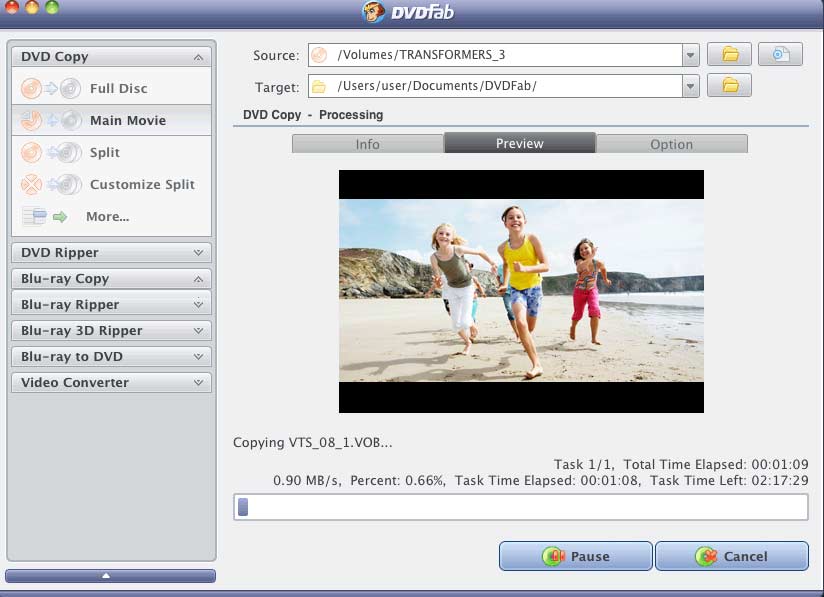

Together, these allow automatically computing the VUK, & hence the Title Keys. The Host Certificate entry lets it request the VID. A matched Processing Key entry (for the disc's MKB version) lets it compute the Media Key. The default DB entries allow libaacs to (more-or-less) jump to Stage 2. Stage 4 (finally!) uses those Title Keys to actually unlock the disc's protected media content.Stage 3 uses that Volume Key to unscramble the disc's scrambled Title Keys.Stage 2 uses that Media Key, together with the disc's Volume ID (VID) - obtained by the player presenting a valid Host Certificate to the drive (unless it's got patched firmware), which then reads the VID from a special "BD-ROM Mark" - to compute the Volume Unique Key (VUK).Stage 1 uses the player's Device Keys, together with a disc's Media Key Block (MKB) data, to retrieve a "Processing Key", and with that (plus another datum from the MKB) to compute the Media Key.Just as a simplified recap, the AACS decryption process for a protected disc by an "approved" player can be said to have roughly four stages: AACS DRM - Keys & certificatesįurther issues can occur with libaacs, if your ~/.config/aacs/KEYDB.cfg database (DB) contains obsolete/revoked keys or certificates, or if in libaacs' OS X edition there's not yet sufficient MMC support for obtaining Volume IDs (in 'Stage 2' below). Place libgcrypt into the same location as libaacs (or wherever appropriate if you're using a custom LD_* or DYLD_* env var). Luckily, a matching recent version ('libgcrypt.11.dylib', at compatibility level 18.0.0) is included within the older VLC 1.1.9+ app-packages (their installers are still available in the VLC archive). The snag: libgcrypt apparently is no longer being shipped within the VLC 2.0.x app-package. Alternatively, the verbose debugging mode described in earlier posts would also show any dependency library that could not be found.įor instance, it turned out that the libaacs library that I dl'd last month (from the whoknowsmy.name domain) has a dependency on the libgcrypt library. The 'otool' exec is better, since it shows not just filenames but the required "compatibility levels" too. usr/bin/strings - /your/path/to/libaacs.dylib | grep. usr/bin/otool -L /your/path/to/libaacs.dylib If the Developer/Xcode Tools are installed:.Note that you can investigate libaacs' dependencies via the command line (Terminal shell), e.g.:. Not only does the 'libaacs.0.dylib' library file currently need to be renamed or symbolically-linked as 'libaacs.dylib', but it typically also has a dependency on at least one other private library (which might not be available for some reason). When using the libaacs library (for AACS-protected content), as nkoriyama mentioned earlier, the (64-bit only?) OS X edition has a few issues. Many thanks must go to nkoriyama & others who uncovered a lot of the details, and of course to the VideoLAN developers for implementing Blu-ray access! Sorry about the length of this post, but I thought it would be useful to offer an approximate summary of VLC 2.0.x's Blu-ray playback functionality so far, under OS X (10.6.8 in my case), along with various workarounds where applicable. I confirmed with following commands (that I wrote another thread on this forum): I cannot judge whether keydb is worng or library is wrong or something else is wrong.īut on Windows, I can play the video with the same disc and drive and keydb.cfg (but no sound, no subtitles ) Missing keys?"īecause failing VUK calculation. When VLC does not load AACS library, the error dialog says "This Blu-Ray Disc needs a library for AACS decoding, and your system does not have it."Īfter VLC load AACS library, the error dialog says "Your system AACS decoding library does not work. AACS dynamic library was loaded properly when setting LD_LIBRARY_PATH. I got this log when only renaming libaacs.0.dylib.Īnd See line 98-100. I have to set environmental variable "LD_LIBRARY_PATH" or so. #2 AACS dynamic library is not loaded from VLC.app/Contents/MacOS/lib. I have to rename libaacs.0.dylib to libaacs.dylib.
#Dvdfab for mac 10.6.8 mac os
There are some problems on playing Blu-ray Discs on Mac OS X.


 0 kommentar(er)
0 kommentar(er)
